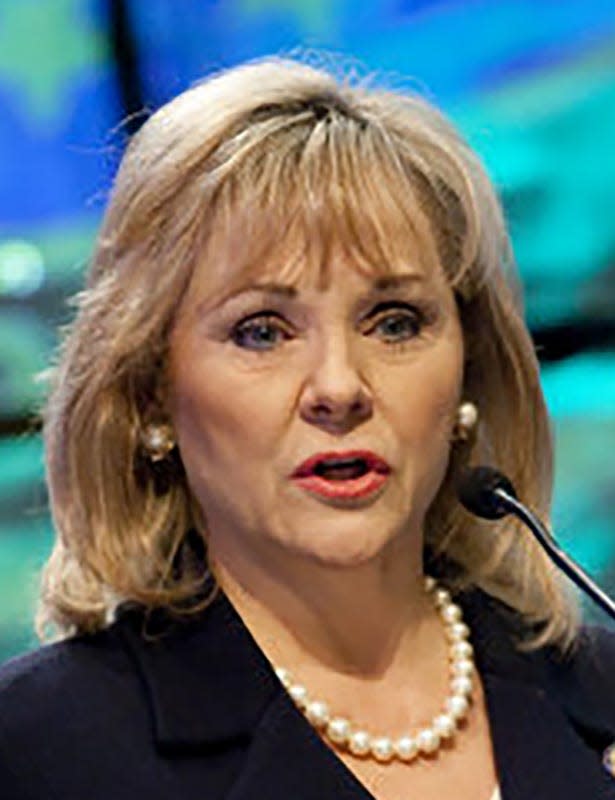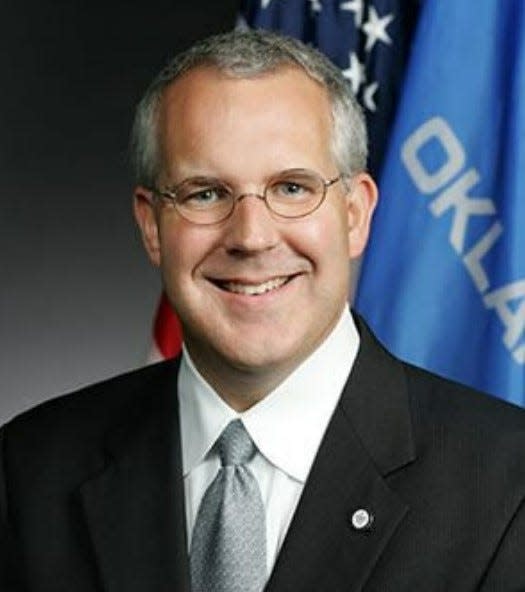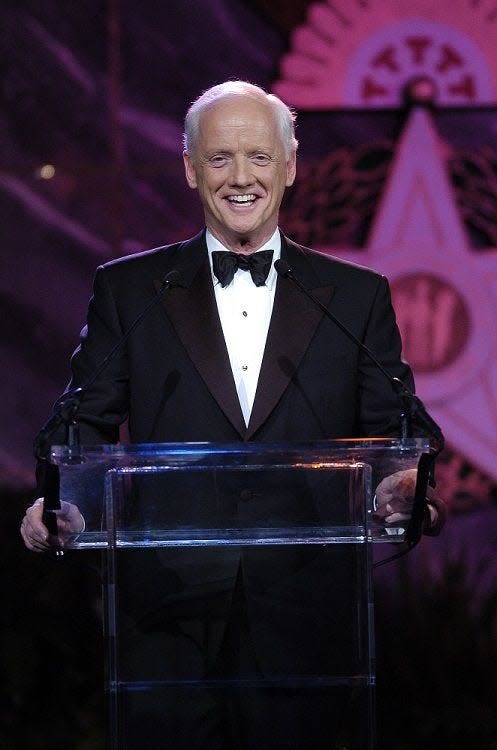OK governors have great record of picking presidential winners, but not joining them in D.C.
- Oops!Something went wrong.Please try again later.
- Oops!Something went wrong.Please try again later.
- Oops!Something went wrong.Please try again later.
- Oops!Something went wrong.Please try again later.
- Oops!Something went wrong.Please try again later.
- Oops!Something went wrong.Please try again later.
- Oops!Something went wrong.Please try again later.
- Oops!Something went wrong.Please try again later.
- Oops!Something went wrong.Please try again later.
- Oops!Something went wrong.Please try again later.
Going back to the late 1980s, two things are true about Oklahoma governors endorsing candidates for president: They have a remarkable record of picking the winners, and they have a terrible record of being rewarded for it.
Gov. Kevin Stitt, a Republican, is the latest chief executive of the state to wade into presidential politics. He announced last weekend that he is supporting Florida Gov. Ron DeSantis for the GOP nomination.
Four of the five governors serving before Stitt endorsed the eventual nominee, who went on to be elected president. None of the five was chosen for the administration, though at least two were considered for Cabinet posts.
Stitt, who just began his second term, said in an interview with the Daily Caller, a conservative online publication, in April that he would be open to a Cabinet position, with a preference for energy secretary.
More: DeSantis reaches out to Oklahoma voters in Tulsa visit; gets Gov. Stitt's endorsement
Here is a look at how Stitt’s most recent predecessors were involved in presidential politics:

Mary Fallin, Republican: Fallin, who served from 2011 to 2019, remained neutral through the hotly contested GOP primaries of 2016. Texas Sen. Ted Cruz finished first in Oklahoma’s primary, with Donald Trump in second. But after Trump secured the nomination, Fallin became a committed supporter and spoke at the Republican National Convention in Cleveland on the same night Trump gave his acceptance speech.
Fallin interviewed at Trump’s office in New York City shortly after the 2016 election but was passed over for a Cabinet post after an “awkward interview” about federal policy.
Trump did choose an Oklahoman, Scott Pruitt, then the state attorney general, for EPA administrator, though Pruitt resigned less than two years later amid numerous scandals.
Fallin had two years left on her second term at the time she was considered for the job. Stitt also will be nearly midway through his second term when the presidential election is held next year.

Brad Henry, Democrat: Henry, who served from 2003 to 2011, endorsed Barack Obama at a crucial time in 2008, when the very tight race between Obama and Hillary Clinton had come down to elected officials and party leaders known as superdelegates. Clinton had bested Obama in Oklahoma’s Democratic primary that year, but superdelegates weren’t bound by those results.
"It's critical that we resolve this Democratic nomination before the convention,” Henry said then. "If this is an open question that we take all the way to the convention, it will be disastrous for our party in November.”
Henry, who was midway through his second term when Obama won, insisted when he made the endorsement and after Obama’s election, that he wasn’t interested in moving his family to Washington for a job in the administration.

Frank Keating, Republican: Keating, who served from 1995 to 2003, came the closest of the recent Oklahoma governors to landing a plum administration post. Keating was an early supporter of then-Texas Gov. George W. Bush and was seriously considered for the vice presidential slot. Dick Cheney, tasked to lead the search for a running mate, wound up being the running mate. After Bush won, Keating appeared to be a lock for attorney general, but didn’t get it, apparently because of concerns about Keating’s relationship with a Wall Street financier. Bush aides leaked information about the relationship, angering Keating and those close to the governor. Keating led two major trade groups in Washington, D.C., after his second term.
David Walters, Democrat: Walters, who served from 1991 to 1995, campaigned for Bill Clinton in 1992 at a time when the former Arkansas governor’s quest appeared doomed.
“He and Rhonda (Walters) were among those who were in the snows of New Hampshire with me,” Clinton said shortly after taking office in 1993.
Walters also helped Clinton during the general election campaign.
Walters was in the middle of his first term when Clinton defeated President George H.W. Bush and was under scrutiny for his 1990 campaign fundraising. He was not among the Oklahomans who were mentioned as serious contenders for Cabinet posts. Those included former U.S. Sen. David Boren and former U.S. Rep. Dave McCurdy.
Clinton chose Tulsa native R. James Woolsey Jr. as director of Central Intelligence, and Adm. William J. Crowe Jr., who graduated from high school in Oklahoma City, as ambassador to the United Kingdom.
Rhonda Walters was appointed to the Truman Scholarship Foundation board.
Henry Bellmon, Republican: Bellmon, who served as governor from 1963 to 1967 and then from 1987 to 1991, was in his second term when Oklahoma held its first presidential primaries, abandoning party caucuses to join with numerous other states for Super Tuesday in 1988. Bellmon endorsed then-Vice President George H.W. Bush about six months before the GOP primary; the Republican field also included Kansas Sen. Robert Dole, with whom Bellmon had served in Washington.
Bush narrowly won Oklahoma’s primary and then the presidency.
Bellmon was 67 when Bush took office and wouldn’t have been interested in a Cabinet post or returning to Washington in another capacity.
Soon after Bush took office, however, Bellmon asked for the president’s help in getting Oklahoma Republicans to support the governor’s education reform and funding plan, House Bill 1017, which included tax hikes. Bellmon got a “cold stare” from Bush’s chief of staff.
Bellmon’s predecessor, Democrat George Nigh, first took office when Democrat Jimmy Carter was president. According to a New York Times article in 1979, Nigh was one of the four Democratic governors who abstained from endorsing Carter’s reelection bid on a resolution supported by 21 other governors. Nigh also declined to pledge himself to a candidate before the 1984 Democratic convention, where Walter Mondale was nominated.
Before Nigh, then-Gov. David Boren, in 1976, was among the non-committed delegates at the caucuses that narrowly selected Carter.
This article originally appeared on Oklahoman: Oklahoma governors have knack for picking presidential winners
